Game Development Career Night: Level Up Your Job Hunting Skills
Seattle videogame game development organizations collaboratively ran a career evening to help local game developers, students, and other professionals with career tips, interviewing, along with resume and portfolio reviews. This is an event summary.

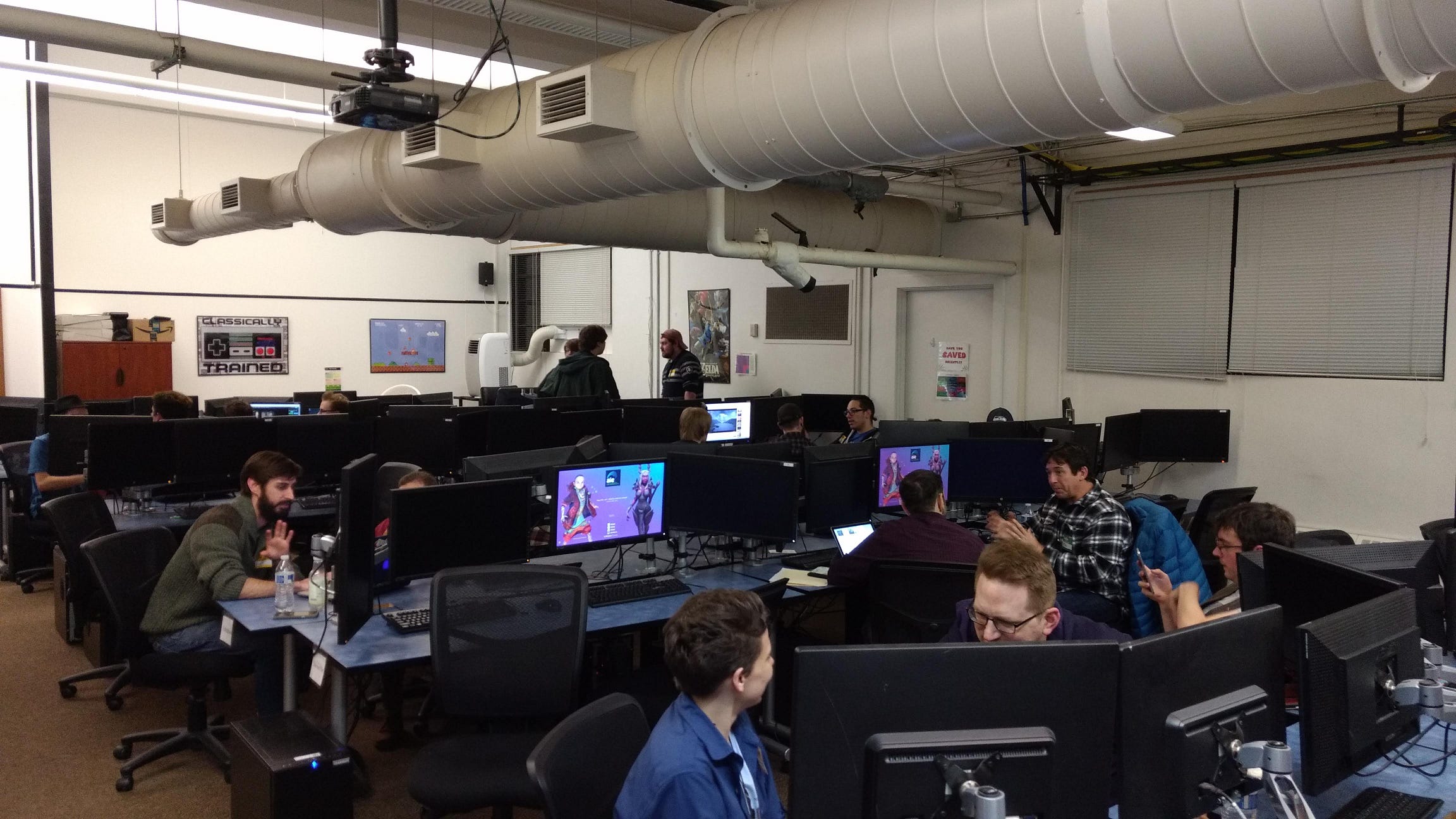
Mentors providing portfolio advice. Photo by Tim.
With additional contributions and editing provided by Tim Cullings, Bilgem Cakir, and Josh Curry.
The Academy of Interactive Entertainment (AIE) and the Seattle Chapter of the International Game Developers Association (IGDA) recently hosted an evening career workshop at AIE’s Seattle, Washington campus called: Game Development Career Night: Level Up Your Job Hunting Skills.
The event was split up into four areas, with plenty of room for fellow game developers and creative professionals of all experience levels to network and gain insight:
Portfolio Reviews
Senior artists from local game studios, including Oculus, Sucker Punch Productions, Against Gravity, and 343 Studios, provided portfolio reviews for digital artists.
Resume Reviews
Recruiters from local game studios, including Catapult, Ranstadt, Keywords Studios and WB, reviewed resumes to take them from the discard pile to the call-back pile!
Mock Interviews
Technical interviewers from current and former hiring managers, including Amazon and others, conducted one-on-one interviews and provided professional feedback to prepare professionals for their dream jobs!
Panel Discussion
This 4-person panel brought honest and hard-hitting questions to recruiters and hiring managers to give listeners the advantage in getting their dream jobs.
IGDA board member Tim Cullings included his summary of the event, which is quoted below:
The evening was full of positive energy with prospective candidates looking for advice on their resumes, portfolios and interview techniques from the 25+ industry veterans and recruiters who showed up to help aspiring game devs and fellow devs looking for a career change on their path to glory. In the art room there was top talent from Against Gravity, Big Fish and Hairbrained Schemes offering advice and critiques on the portfolios of animators, environment, character and concept artists to bring their skills to the next level and land their dream jobs. More than one solid mentor relationship was formed during these sessions and has continued on past the event.
Recruiters from WB Monolith, Ranstadt and Keywords Studios gave feedback on resumes and offered advice for people looking to pursue careers in the industry, making sure that their resumes would not just end up instantly passed over or in the trash and they would get that callback for an interview.
A team of senior studio heads from Harebrained Schemes set up shop in a couple of the classrooms to give mock interviews to attendees looking for assistance on honing their abilities to make it past the final obstacle in their quest to land the jobs they desire. All of the participants came away feeling energized with actionable feedback to practice and improve on.
In between sessions attendees relaxed and chatted over fresh baked cupcakes, provided by Board Member Erica, comparing notes on their experiences throughout the night and sharing stories about what brought them to the event. One team of independent developers made the 3hr trek up from Portland to make new connections in the industry and get some advice on the new indie adventure they were embarking on. They came away with new friends, feeling like the trip was well worth their time and effort and hoping to join us for future events.
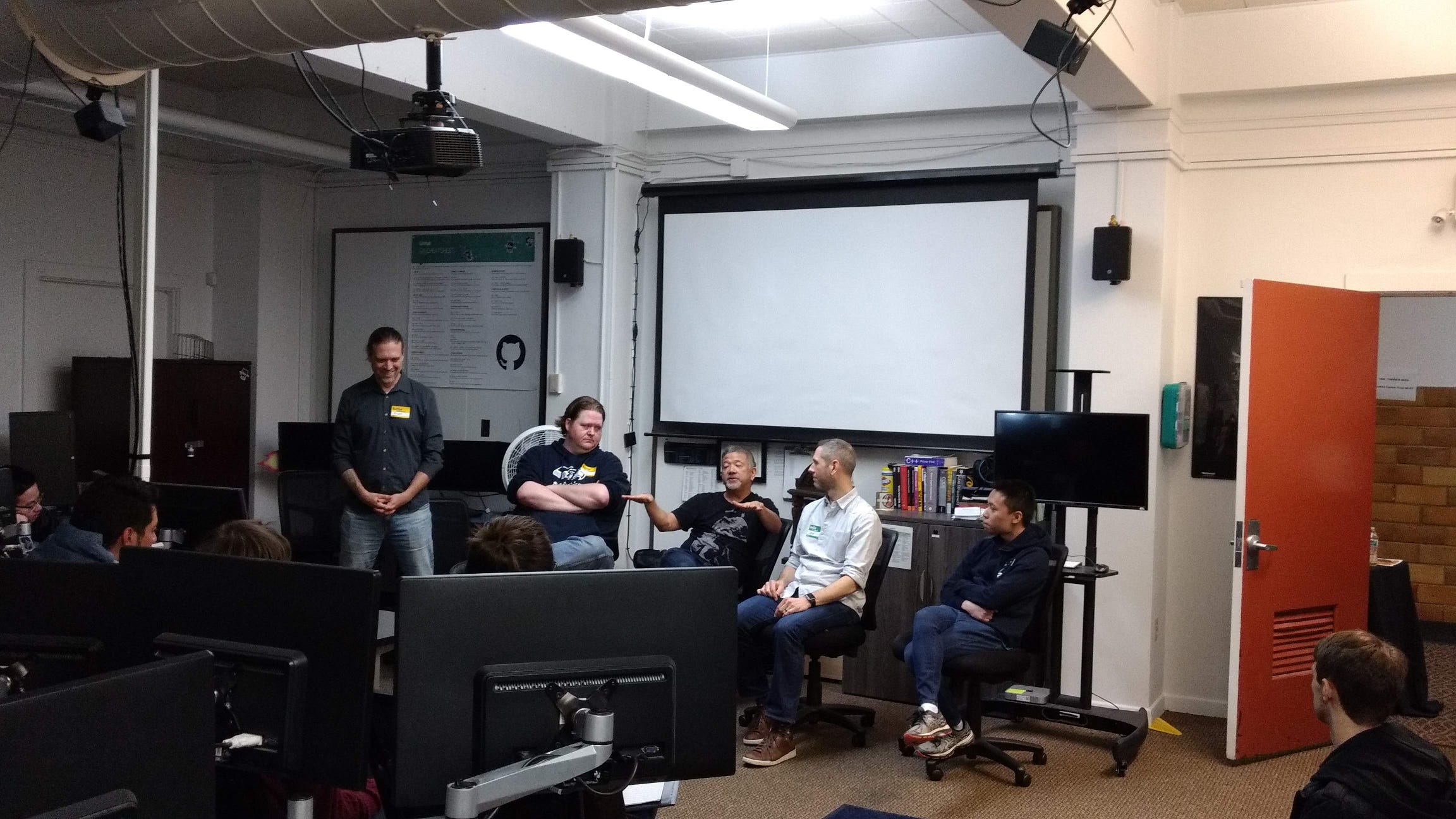
Panel of professionals discussing career advice. Photo by Tim.
Here were the highlights of the panel discussion:
What should a good resume contain?
Your resume should tell the story of your career and education. It should show your attention to detail and a willingness to collaborate with other people and other teams.
Resumes should show that you’re serious about getting a job. For entry-level candidates, that could mean anything from showing school projects to passion projects that are relevant to the job and show you’re curious about developing career-applicable skills.
Make sure that projects emphasize skills that are relevant to the job. “Believe it or not, the same problems you ran into on your student project are the same types of problems you might run into at Bungie!”
Does your resume show that you can engage with other departments and people?
Make sure your resume is proofread and succinct.
What are resume yellow/red flags?
Red flags: Resumes that are confusing to read, contain irrelevant information, or don’t show a clear career path.
Yellow flags: Resumes that have spelling mistakes.
Long resumes: “Unless you’re a PhD, or have years of relevant experience in the field, cut it down to one or maybe two pages.” Use a service like LinkedIn to provide your entire career history.
Entries that are a rote list of tasks like you’d see in a job description. Cut, or reword, any entry that doesn't show how you added value or reduced costs to a project or job duty. Focus on showing the specific results that you enabled through the work you provided.
Why are there so many “weird programming questions” in interviews?
“The Interviewing process tries hard to avoid false positives, at the cost of resulting in many unintentional false negatives.”
Interviewing helps ensure that a candidate’s resume correctly matches their skill set.
This means that the questions shouldn't be easily found online and studied before the interview.
“Answering these absurd problems will help you for the real world.”
There are three specific qualities of any good interview question:
The question must be difficult.
The question must be relevant to the position and what you’ll actually do on the job. For example, if you’re interviewing for a programming job, the interview questions must rely on fundamental Computer Science concepts to properly test a candidate’s proficiency with the material.
The question must be solvable within a reasonable amount of time. Many candidates that show a good understanding of the process but don’t solve the problem would still be considered.
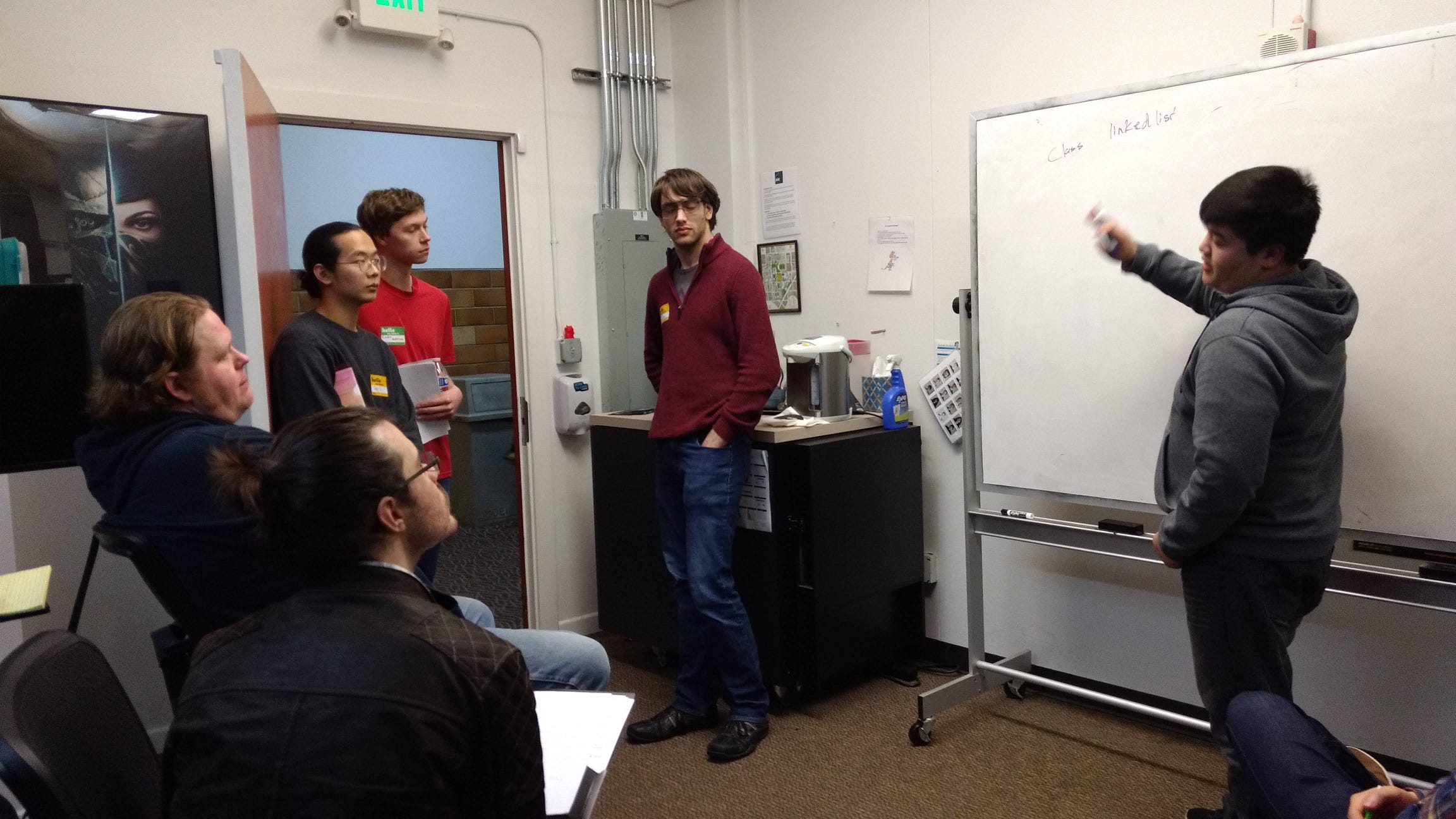
An audience member later practicing answering a whiteboard question. Photo by Tim.
Why do we still use “whiteboard questions” as part of interviews?
What are whiteboard questions?
Whiteboard interviews are where you’re given a problem on a physical whiteboard or a computer and must identify the solution.
Examples could range from pre-written code that can’t execute to being asked to write a simple script around certain parameters.
Why use the whiteboard questions?
Whiteboard questions “aren't great, but [answering them is] an important skill to have,” because they help the interviewers see your thought process when handling a problem.
The interviewer isn't necessarily looking for a correct answer or a 100% completion of whiteboard questions. If you’re not sure of the answer, feel free to talk the question through out loud. If they can understand your logic and thought process as you attempt to solve the problem, sometimes that can be enough.
Answers to whiteboard questions can either be broad or specific, depending on the team and the role for which you’re interviewing. The questions might be more rigorous if the tools you’re being tested are market-standard tools and will be used immediately on the job.
What are some good attitudes to have toward interviewing?
“Don’t let interview questions get you down.”
“Stay positive and just go with it.”
“I embrace a neutral mindset, like stoicism, when I go into interviews.”
“You should always be learning about interviewing techniques.”
“Learn from your mistakes with prior interviews. Use that to your advantage.”
“Rather than focusing on the negatives, celebrate that you did your best in the interview.”
“They aren't just picking you. You are also picking the company.”
“If you make it to an in-person interview, they likely want to hire you. Be positive, but not overconfident, and show them the best you have to offer.”
How can we deal with the anxiety of interviewing?
What is anxiety and how can we recognize it?
Anxiety is an emotion involving feelings of worry and fear.
Anxiety can be characterized in the short-term, such as worry over doing well in an interview, or long-term fear over any situation.
People that suffer from anxiety have used breathing techniques and focusing on specific positive elements of a situation to overcome panic attacks.
Interviews are full of anxiety. You’ll feel anxious as an interviewer, meeting new people, and putting your best foot forward to get the job. Your interviewers will feel anxious about making the right hiring decision.
If you recognize you are feeling anxious during an interview, proactively address the stressful feelings, you can do well.
Anxiety can be reduced by preparing for the interview. Fear of the unknown can be a trigger of anxiety. Giving yourself enough time ahead of the interview to study interviewing techniques.
General tips for tackling anxiety during interviews
Control and redirect the negative energy, especially when you’re stuck on a tough question, to break the question down into something more solvable.
Don’t think too much about a question that is too challenging.
Try to reset your expectations to better address the next question.
Don’t let negative self-talk bother you during the interview.
Focusing on the next question.
Overcoming anxiety related to difficult questions
Ask the interviewer questions that clarify a point or question.
This is useful in general, but specifically, if you’re not sure or feeling overwhelmed.
The difference between that anxious unknown and something you understand might just be one rephrased question.
Speak the question out loud, in your own words, if you’re not sure
“Think out loud,” almost like you’re having an external monologue with the interviewers, to avoid silence.
Talking through the problem out loud will help the interviews gauge your level of understanding with the material and your thought process.
They may give you hints to unblock you. When you repeat your understanding of their question out loud, if there was a part you misunderstood or assumed, the interviewers may help guide you along.
The interviewers may also help guide you along through the problem. Especially if you’re thinking in a direction that might be close, but isn't quite what they’re looking for, in order to solve the problem.
“Interviewers can’t read your mind!”
General tips for tackling anxiety after interviews
Remember that interviews are full of anxiety for all parties.
Interviewing is costly for the company to set aside time for its employees to interview people. Everyone involved is taking time out of their jobs to interview and they often times need to get back to work.
Most interviewers aren't full-time interviewers.
Prepare for high false negatives.
Interviewing well and yet not getting the job happens to good, qualified people.
Don’t let a rejection letter make you feel bad.
Send a polite thank you email or letter to everyone you met, especially if you received a business card. This will help you focus on the positives of the interview and you’ll reappear positively in the mind(s) of the interviewer(s).
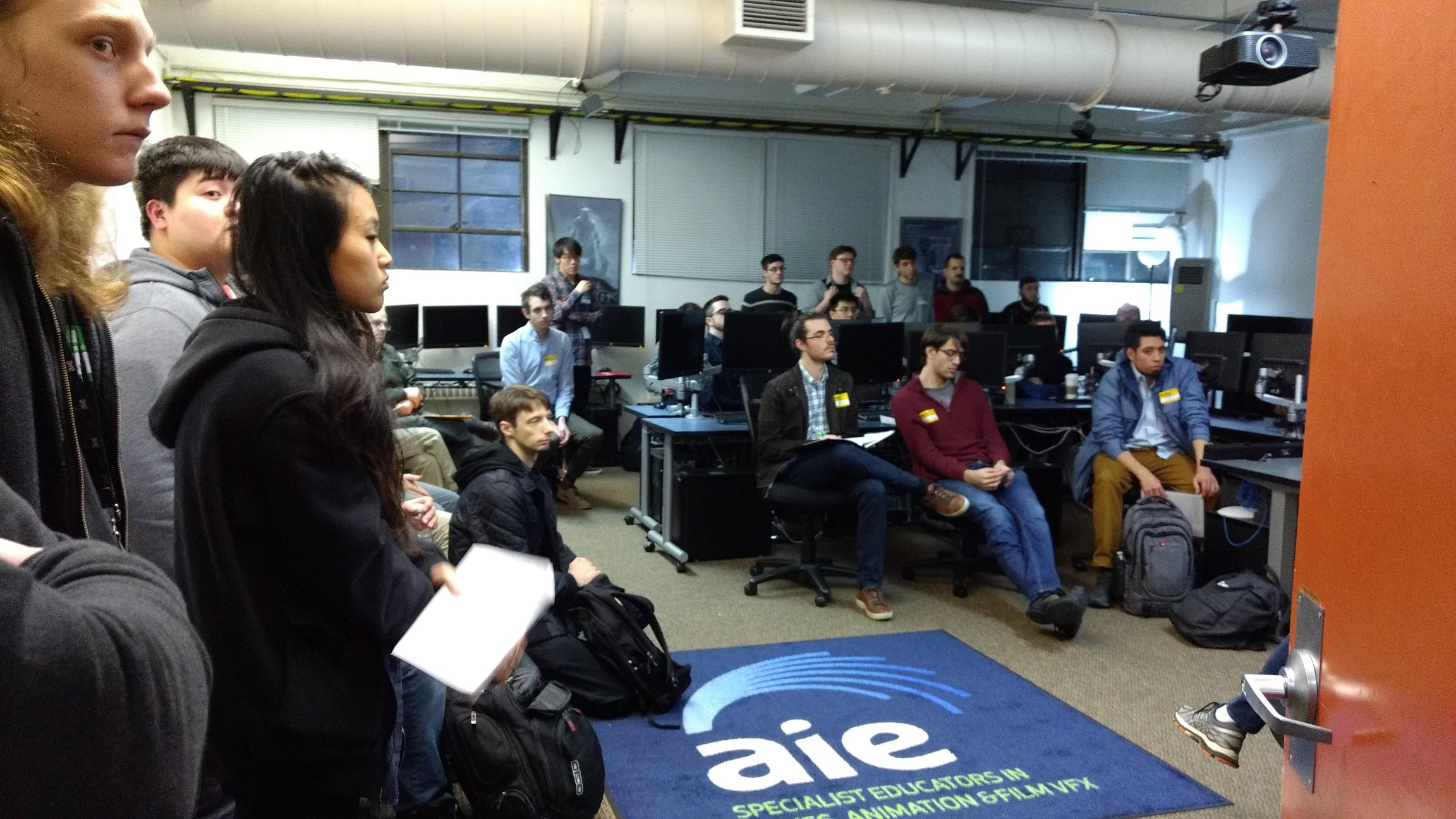
Audience listening in to the panel of professionals give career advice. Photo by Tim.
Addressing conflicts and touchy subjects within interviews:
Keep a good attitude
The interviewer(s) wants nothing more than for you to succeed.
You’re never programming or working alone.
“Game development is not a solo activity. You’ll talk with artists and other people constantly.”
“Save your hot takes!”
Don’t talk about or focus on negatives.
Never “throw people under the bus,” even if you feel it may be justified.
Don’t bring up any controversial topics or negative statements.
Even if you feel an opinion is universal, there could be someone in the room with a different point of view.
Don’t argue or fight any interviewer(s)
If you don’t agree on a particular topic within the interview, remain professional by asking questions that invite collaboration, such as: “How should I approach this?” “Can you explain your perspective so I can understand it better?”
One of the interviewers in the room could be your future boss.
Many managers appreciate when their employees can look at things from different perspectives.
“You could be wrong” about your approach to a particular topic.
Don’t take up too much time
Networking during an interview is a great idea, but remember they have work that still needs attention when they leave the interview.
If you’re scheduled to interview for one hour, try to be mindful of that time.
A good question to ask when asked: “Do you have any questions for [us]?” “How much time do we have for questions?”
Answering bad questions
Sometimes, the interviewers don’t have the skill set to ask good questions themselves.
Be ready to redirect questions based on how the interviewers ask their questions.
The people you’re interviewing with are usually not professional interviewers. If an interviewer asks an illegal or unethical question about your age or other confidential information, feel free to redirect them away from that question. It could be an innocent mistake.
You may be more knowledgeable about current interviewing policies and practices than your interviewer(s).
“Why did you leave [your last/this] job?”
This is a common question in interviews which can gauge the emotions of how a candidate might act or react in certain situations.
Be prepared to hold a conversation between 30 seconds and 2 minutes about the circumstances behind why you’re no longer working at any job listed on your resume.
Keep it positive. Even if you left the job because of a conflict, keep your composure, and avoid speaking negatively about any former colleagues or managers.
How do you prepare for “the day before” the interview?
Do your research on the company
Read about the company history. Who founded the company? Who runs the company now? How many locations do they have worldwide?
Summarize the mission statement and relevant company values.
Understand the mindset of the company. “The way Bungie asks questions will be different than Microsoft.”
“Know your audience. Know the company.”
Focus on your positives to sell your resume
Re-read the job description. Focus on how your accomplishments tie together with the duties for the job.
Be ready to talk at length about past or current project. Have a story to tell about all of your projects. Rehearse your story to ensure it flows well.
Can you hold a 5-minute conversation about anything that’s on your resume or relevant to the interview?
Are there any negative points that you might accidentally mention?
Keep an accurate level of self-reflection of your work. Speak honestly about your faults and how you learned from them just as you would speak about positive events.
General tips
Take care of yourself the evening before your interview.
Eat a good meal.
Schedule plenty of time to get a good night’s rest.
Research the amount of time you’ll need to drive or bus to the interview area. Factor in enough time in case you become lost or unforeseen factors cause you to potentially become late.
Set aside your interview clothes so there will be less to consider the morning of the interview.
Additional reading
Read any relevant news article related to your job role or the company.
Read The Algorithm Design Manual, as summarized in this YouTube video, and in particular study the last chapter on Backtracking.
Read Steve Yegge’s essay “Why I Left Google To Join Grab” as featured here on Medium.
How do you prepare for “the day of” the interview?
General Tips
Eat a good breakfast. Chances are, you probably won’t feel hungry, but eat something nourishing regardless.
Do some light exercise or stretches.
Listen to some upbeat comedy to get into a good mood.
Review your relevant projects
Re-read your resume.
Review your accomplishments over the past six months to get yourself into a positive head-space. This will help iron out any conflicts or strengthen any pitches that you can talk about during the interview.
Try to get into the headspace of your work, like you are going to work. You won’t learn anything new, but this will help prepare your mind and steel your resolve.
Arrive early
Don’t procrastinate leaving your residence.
Plan to be in the area between 15 to 30 minutes ahead of schedule. This will, again, give enough time in case you become lost or unforeseen factors cause you to potentially become late. If you arrive significantly earlier than this, you can also use this time to find a quiet place to check your email or focus on your interview.
Don’t check into the lobby more than 15 minutes early.
Questions from the audience:
How do I handle communicating with recruiters?
Recruiters want to get you in the door. Recruiters are working with you, not against you.
“It might not seem like it, but some recruiters have technical skill and know exactly what skills are needed for the job, and should know about the general requirements of the job.”
How should I handle take-home projects? Should I show off my skills by making the project fancy?
Take-home projects are problems given in advance of the interview and can act as companion pieces to whiteboard questions.
Focus on making the project solid first, and not fancy.
Bring up during the interview certain ways that you would improve on the take-home question.
What’s the value of contracting?
Contracting is a great way to get your foot in the door.
Contracts are legally-binding documents. Everything in writing must happen. Everything stated verbally or implied throughout the direction of the contract is just a bonus. If there is no statement about “contract to hire,” don’t assume it will happen.
During a contract, prove to your team and manager that you are a valuable resource. This can help you become a permanent member of the team.
The lecture split off from here into two parts.
IGDA moderator, Bilgem, and one of the panelists met with audience members interested in learning specific whiteboard exercises. Participants could see how interviewers structure whiteboard questions and collaboratively solve these exercises.
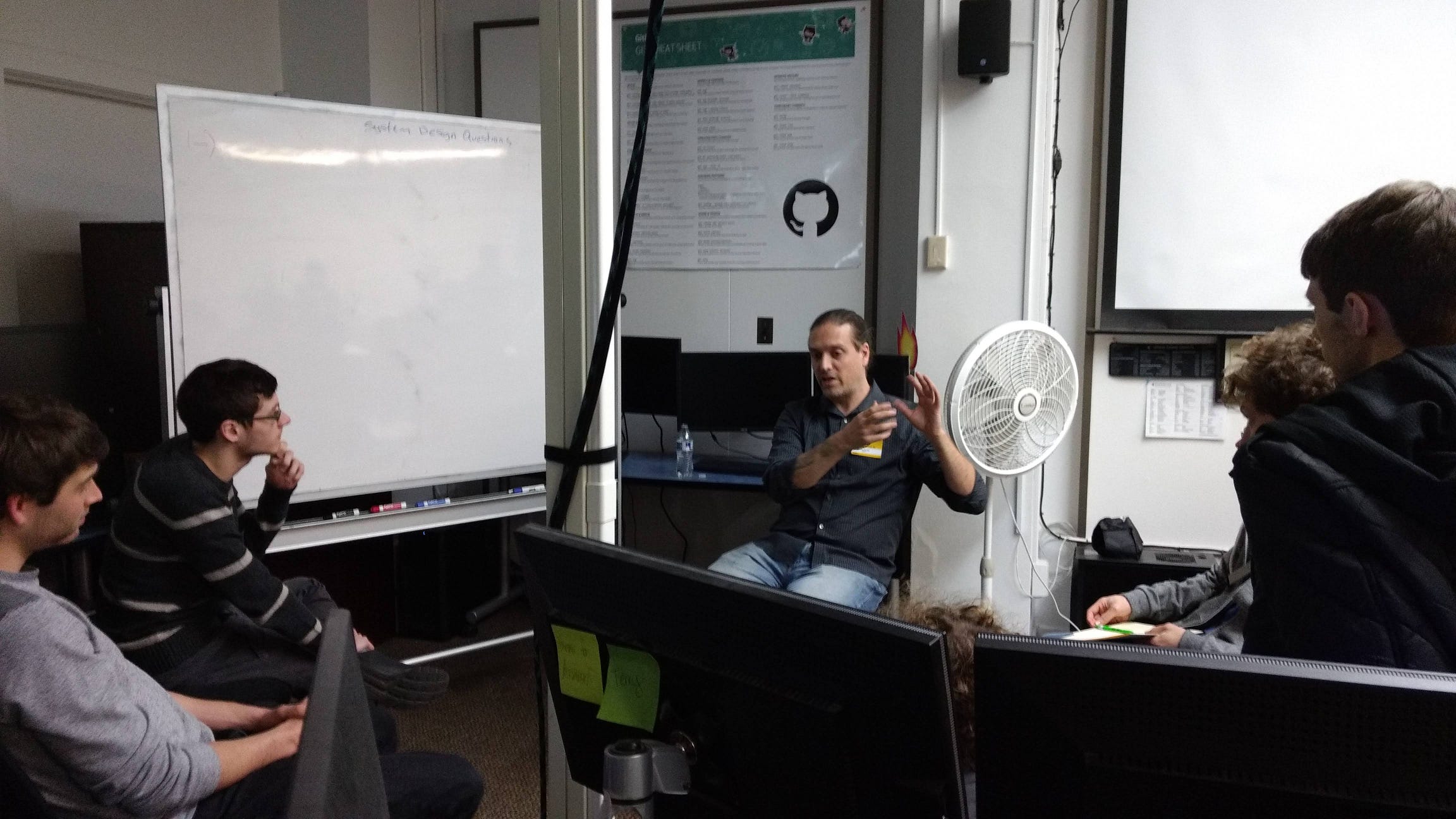
IGDA member Bilgem providing career advice. Photo by Tim.
The remaining panel members met with a smaller cluster of audience members to discuss behavioral interviews and practice interviewing techniques.
Behavioral interviewing
What are behavioral interviews?
Behavioral interviews will ask more specific questions to prove what you've done in specific problem-solving situations.
Questions in behavioral interviews will not be yes or not. Instead, the questions are more statements about yourself: “Tell me about [a certain] situation?” “Can you provide an example of a time where you changed [a major component or operation within your work]?” “Tell me about a time that someone changed your opinion.”
You may also get questions such as: “Estimate your timeline for [any given situation].” When you provide an estimate for a large amount of work to do, feel free to ask for clarification.
Expect questions about teamwork, disagreements, and frustrations. Have good stories in mind related to these that present you in a positive light, and the lessons you've learned.
Be open to having a conversation with any of the answers you give.
Doing well in behavioral interviews
You will want to talk about actual lessons learned, not just minor things, to show that you can be a good team player, and you've learned from past mistakes.
Non-industry answers to behavioral interview questions are expected. Especially if you have just graduated or are still in school, they don’t have the same expectations that you have a lot of experience in the field as they would if you had a good amount of job experience under your belt.
“A really positive win is if you can show an example of how you've changed your mind in a particular situation. That shows you’re flexible and willing to work with others.”
Use the S.T.A.R. format when answering questions in interviews
Situation — This was the situation.
Task — This is what needed to happen.
Action — This is what I did.
Result — This was the result of this action.
Framing answers in the S.T.A.R. format will give the interviewers a clear understanding of what makes you stand out.
Asking an audience member a behavioral interview question and providing the audience with live feedback
“What is an example of a situation where you took a big risk and it failed?”
If you don’t have a good answer lined up, avoid silence, saying “umm…” or using other linguistic filler words or sounds.
Ask broad questions to get to a more specific question, for example: “What kind of risks are you asking about in particular?”
Ask if you can return to the question later on in the interview.
If you ask questions like these, you can avoid the silence you might get while thinking, which will help you regroup so you can answer the question better.
“You sometimes have to normalize the power dynamics by educating the interviewer as you tell the story.”
“Try to describe your story like Stack Overflow, where you have to state how you have a valid problem and describe your situation clearly.”
Summary of behavioral interviews, and interviews, in general:
Job interviews feel like a test. They are an evaluation of fit.
Interviewing is a two-way street. You’re figuring out if you like them and they’re figuring out if they like you.
Don’t let the interviewing process bring you down.
Interviewing is tough for everyone involved.
Make sure to speak to your strengths and avoid dwelling on the negatives of your past mistakes.
IGDA Seattle is the Seattle chapter of the International Game Developers Association, the largest non-profit membership organization in the world serving all individuals who create games. IGDA is designed to improve the lives of its members by enabling networking opportunities and developing growth opportunities. Our events are open to members and non-members alike. Job seekers in the games industry should post their resume on http://careers.igda.org/ so prospective employers can easily find you and reach out, it is free to anyone to post.
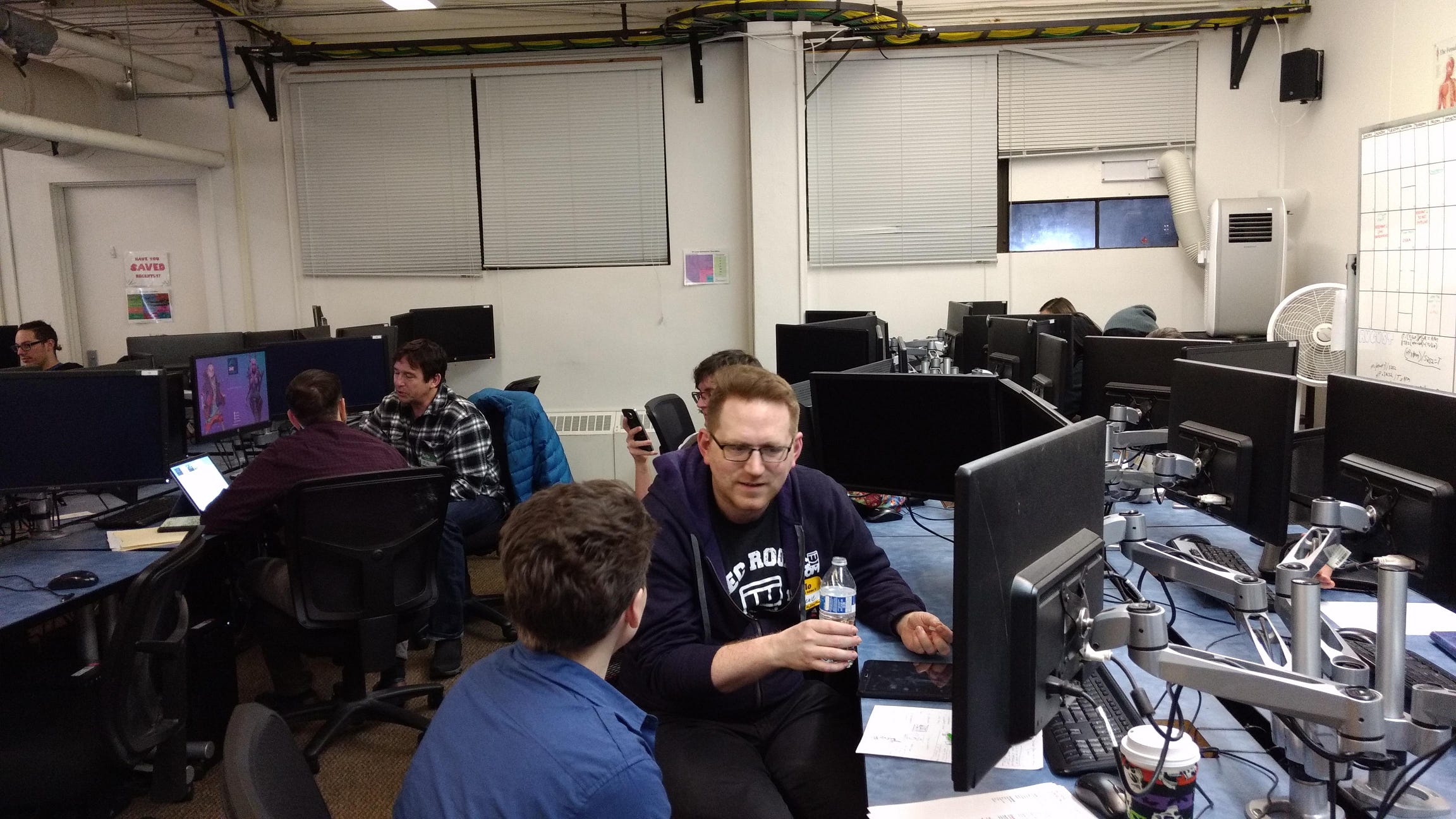
IGDA member Terence Tolman providing career advice. Photo by Tim.
Read more about:
BlogsAbout the Author(s)
You May Also Like













